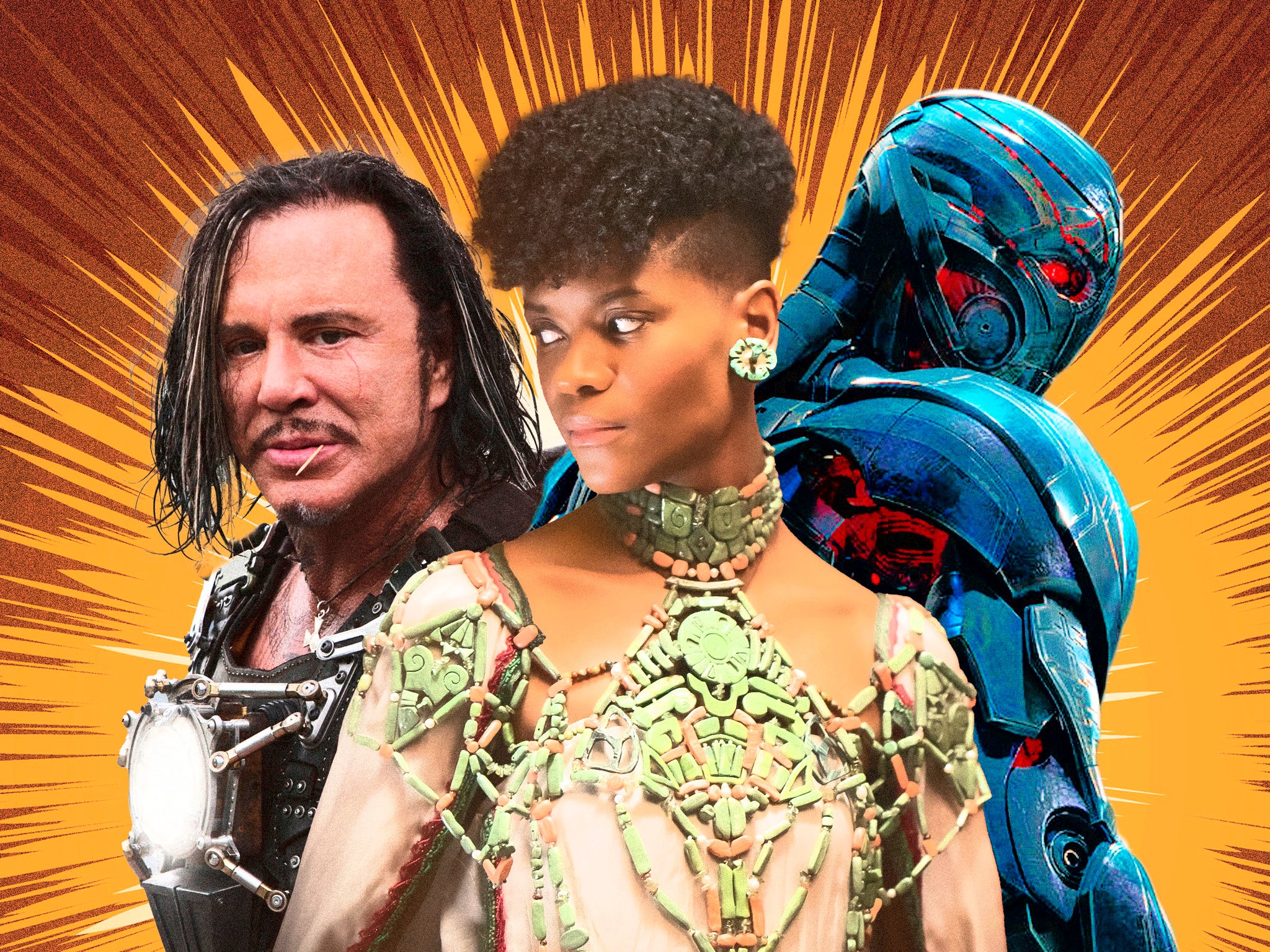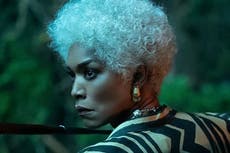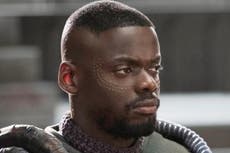Marvel can’t do sequels – Black Panther: Wakanda Forever is further proof
The new ‘Black Panther’ sequel is simultaneously overstuffed and undercooked, writes Ed Power. And proof that Marvel still struggles to make decent part twos

Black Panther: Wakanda Forever arrives with a Hulk-smashing weight on its shoulders. Ryan Coogler’s just-released follow-up to the original Black Panther, from 2018, faces the daunting two-for-one challenge of both providing Marvel audiences with the visceral excitement they crave, while also honouring the legacy of the late Chadwick Boseman.
Boseman died from cancer in August 2020 – less than eight months before he was set to reprise the part of heroic T’Challa in the sequel. Hastily rewritten by Coogler, the film now walks a tricky tightrope. It must simultaneously function as homage to Boseman, and open up a new chapter for Wakanda, the fictional superhero kingdom in East Africa.
But if you set aside the tragic loss of Boseman, Wakanda Forever is significant for another reason. The Marvel Cinematic Universe is one of the great achievements of modern filmmaking – weaving together multiple characters and stories across 30 features and counting. Yet, in one respect, it has constantly fallen short. When it comes to direct sequels, it is more villain than hero.
Marvel’s sequel problem spans the entirety of the MCU: from the dire Iron Man 2 in 2010 to the appalling Doctor Strange and the Multiverse of Madness – aka Doctor Strange 2 – earlier this year. Again and again, whenever Marvel follows up a hit with another movie featuring the same protagonist, the results invariably fall short. How can a series that gets so much right fail consistently at the same thing? And what does it tell us about the strengths and weaknesses of MCU boss Kevin Feige’s vision for the franchise?
At the outset, it should be acknowledged that there is one exception to this golden rule of Marvel and its creaky sequels: 2014’s Captain America: The Winter Soldier. This taut thriller inserted Chris Evans’s stars’n’stripes-shrouded lunk into a multi-layered political conspiracy. It also marked the entry into Marvel of writer-director brothers Anthony and Joe Russo (who would go on to make the two finest MCU flicks, Avengers: Infinity War and Endgame). Above all, it demonstrated that with the correct script and the right approach, Marvel sequels can soar. So why does it today stand out as such an anomaly?
Winter Soldier aside, each Marvel sequel has failed in its own specific way. With Iron Man 2, the consensus is that returning director Jon Favreau made the classic error of trying to squeeze in too many villains. He did so by setting Robert Downey Jr’s Iron Man up against both Mickey Rourke’s rogue physicist Ivan Vanko, aka Whiplash, and Sam Rockwell’s camp arms dealer, Justin Hammer.
Yet according to Rourke, the issues ran deeper than that. “At the end of the day you’ve got some nerd with a pocketful of money calling the shots,” he complained to CraveOnline. “Favreau didn’t call the shots. I wish he would have… Marvel just wanted a one-dimensional bad guy, so most of [my] performance ended up on the floor.”
The title of worst Marvel sequel rested with Iron Man 2 for a mere three years. In 2013, Feige and co outdid themselves with the sterile Thor: The Dark World. This time the issue was that the studio was trying too hard to latch on to prevailing trends – which in 2013 included the all-conquering Game of Thrones. Feige and co went so far as to hire a director off the fantasy bonkbuster in the form of Alan Taylor.
What Taylor didn’t know was that he’d signed up for an already troubled project. Unhappy with the script, Patty Jenkins – later to direct Wonder Woman – had already exited. Her fear, she had said, was that she would receive the blame if the film was a disaster – and that, as the first woman to direct an MCU picture, the negative impact would go beyond her career. Instead, it would be used as… well, a Thor’s hammer against all female directors.

Watch Apple TV+ free for 7 day
New subscribers only. £9.99/mo. after free trial. Plan auto-renews until cancelled.
ADVERTISEMENT. If you sign up to this service we will earn commission. This revenue helps to fund journalism across The Independent.

Watch Apple TV+ free for 7 day
New subscribers only. £9.99/mo. after free trial. Plan auto-renews until cancelled.
ADVERTISEMENT. If you sign up to this service we will earn commission. This revenue helps to fund journalism across The Independent.
“You can’t do movies you don’t believe in,” she told Vanity Fair in 2020. “The only reason to do it would be to prove to people that I could. But it wouldn’t have proved anything if I didn’t succeed. I don’t think that I would have gotten another chance.”
Thor 2 also suffered for trying to establish a gloomier tone than its predecessor, while also retaining the lighter elements of the franchise that fans loved. The Dark World had originally ended with the death of Thor’s devilish step-sibling Loki. However, when test audiences refused to believe Tom Hiddleston’s trickster god was kaput (they assumed it was a sleight of hand), Marvel reversed gear. Loki would live after all.
“The version I had started with had more childlike wonder; there was this imagery of children, which started the whole thing,” is how Taylor described his “Taylor Cut” to the Hollywood Reporter. “There was a slightly more magical quality … There were major plot differences that were inverted in the cutting room and with additional photography — people [such as Loki] who had died were not dead, people who had broken up were back together again. I think I would like my version.”

With the MCU sequels, there is often a sense that Marvel is surprised by its own success. The original Thor – a film about a camp Viking with a magic hammer – really shouldn’t have worked. Director Kenneth Branagh elevated a pulp property to something living, breathing and deeply charming. There was a sense of lightning being captured in a bottle. Second time around, Marvel didn’t know how to conjure that unlikely magic again. Ultimately it got Thor back on track by working with the singular Taika Waititi, who injected into the brand his distinctively zany humour for Thor: Ragnorak. But it leaves The Dark World as the Thor films’ unloved outlier.
“I really admire the skill set of somebody who can go in with a very personal vision – like Taika Waititi – and manage to combine it with the big corporate demands,” said Taylor. “I think my skill set may be different.”
Sequelitis likewise bedevilled Avengers: Age of Ultron. The original 2012 Avengers had succeeded despite the conventional wisdom that a superhero team-up was bound to be a bloated mess. However, when the studio returned with Age of Ultron in 2015, Avengers director Joss Whedon found it impossible to repeat the three-card trick of his original film.
One problem was that, in his eagerness to give his heroes moments of humanity, he contrived an unconvincing romance between Scarlett Johansson’s Black Widow and Bruce Banner, aka the Hulk (a hangdog Mark Ruffalo). He was under pressure, too, to introduce story elements that would set up future Marvel excursions – such as the tensions between Captain America and Tony Stark that would bubble over into 2016’s Captain American: Civil War.

But above all, and as with the second Thor and Iron Man, there was a sense that having already moved mountains, Whedon lacked the emotional energy to do it all over again.
“I was so beaten down by the process,” he told a public audience at the Tribeca Film Festival in 2016. “Some of that was conflicting with Marvel, which is inevitable. A lot of it was about my own work, and I was… exhausted.”
He was later criticised for turning Black Widow into a glorified emotional appendage to the Hulk (throughout Age of Ultron she is either hyper-sexualised or depicted as kind and mothering). That critique was part of a subsequent re-examination of Whedon’s oeuvre, aided by allegations of unprofessional behaviour by collaborators both pre-Marvel (such as Buffy star Charisma Carpenter) and post (practically every cast member of his doomed 2017 DC movie Justice League). Whedon has long since vanished from the Marvel story. Yet its sequel issues endure.
This year Doctor Strange and the Multiverse of Madness was a CGI horror show lacking the mystical brio of its predecessor and over-reliant on trippy effects. Wakanda Forever, meanwhile, has a cobbled-together sensibility, albeit an understandable one in the wake of Boseman’s death. Reviews for the film have been mixed. The Independent has praised it as sensitive and affecting, critic Clarisse Loughrey writing that it “feels subsumed under a great shadow of loss”, with “every frame draped in tender sorrow”. Others, though, have been less positive. “Threadbare and pallid,” wrote Vulture. “Hopelessly stalled… repetitive, over-familiar… occasionally incoherent,” agreed the Washington Post.
When the focus is on beloved characters such as T’challa’s little sister Shuri (Letitia Wright) and his mother Ramona (Angela Bassett), Wakanda Forever works beautifully. Alas, aquatic antagonist Namor (Tenoch Huerta) is undercooked and insufficiently villainous. The nearly three-hour run time, too, manages to be at once stultifying and rushed. Wakanda Forever gets one thing right by opening with a moving funeral scene that is a tribute both to T’challa and the actor who played him.
Yet as a limp follow-up to a great movie, the film reminds us that – to mix our comic book metaphors – sequels remain Marvel’s ultimate kryptonite.
‘Black Panther: Wakanda Forever’ is in cinemas now
Join our commenting forum
Join thought-provoking conversations, follow other Independent readers and see their replies
Comments


Bookmark popover
Removed from bookmarks